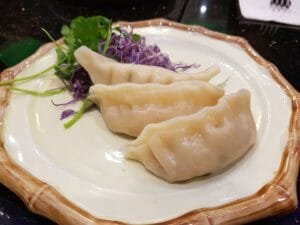It is easy to express approximate numbers in Chinese; expressions emphasizing approximations in Chinese can take the following forms.
(1) 几 Jǐ (a few)
几根香蕉 jǐ gēn xiāngjiāo (a few bananas)
几个蛋糕 jǐ ge dàngāo (a few cakes)
几个同事 jǐ ge tóngshì (a few colleagues)
几瓶水 jǐ píng shuǐ (a few bottles of water)
几杯可乐 jǐ píng kělè (a few bottles of coke)
“几 Jǐ” can also mean “or so, and more” when used after “十 shí (ten)”.
二十几个同事 èrshí jǐ ge tóngshì (twenty or so colleages)
十几个朋友 shí jǐ ge péngyǒu (a dozen or so friends)
二十几岁 èrshí jǐ suì (a dozen or so years old)
十几本书 shí jǐ běn shū (a dozen or so books)
(2) 来 lái (or so) & 多 duō (just over)
来 lái, meaning “or so,” and 多 duō, meaning “just over,” inserted after 十 shí “ten.” However, whereas “多 duō” can also be used after “百 bǎi hundred,” “千 qiān thousand,” or “万 wànten thousand,” “来 lái” is only used after “百 bǎi hundred.”
他的公司有一百来个员工。
Tā de gōngsī yǒu yībǎi lái ge yuángōng.
(His company has about a hundred employees.)
一百来块钱就可以买一条好看的裙子。
Yībǎi lái kuài qián jiù kěyǐ mǎi yītiáo hǎokàn de qúnzi.
(You can buy a beautiful dress for a hundred dollars or so.)
这儿的水果真便宜,五公斤苹果才十多块钱。
Zhèr de shuǐguǒ zhēn piányí, wǔ gōngjīn píngguǒ cái shí duō kuài qián.
(The fruit here is really cheap; five kilograms of apples cost only a little bit more than ten yuan.)
我们学校有二十多个中文老师。
Wǒmen xuéxiào yǒu èrshí duō ge zhōngwén lǎoshī.
(There are over twenty Chinese teachers in our school.)
Note: When the number is not ten or a multiple of ten, “多 duō” must appear after the measure word. When talking about age, distance, height, weight, money, etc., are situations when this occurs.
我外甥一岁多了,会走路了。
Wǒ wàishēng yī suì duōle, huì zǒulùle.
(My nephew is over a year old and can walk.)
你看起来一米八多高。
Nǐ kàn qǐlái yī mǐ bā duō gāo.
(You look over 1.8 meters tall.)
我家里公司很近,距离一公里多。
Wǒ jiālǐ gōngsī hěn jìn, jùlí yī gōnglǐ duō.
(My home company is close, more than one kilometer away.)

(3) Two consecutive numbers
Now we will look at approximation in Chinese, where two numbers from one to nine come after each other in ascending order, either by themselves or in pairs with larger numbers.
我约了四五个朋友一起去打球。
Wǒ yuēle sìwǔ ge péngyǒu yīqǐ qù dǎqiú.
(I invited four to five friends to play together.)
弟弟玩了三四个小时电脑游戏。
Dìdì wánle sānsì ge xiǎoshí diànnǎo yóuxì.
(The younger brother played computer games for three to four hours.)
他买了七八本新书。
Tā mǎile qībā běn xīnshū.
(He bought about seven or eight new books.)
我们公司只有四五十个男员工。
Wǒmen gōngsī zhǐyǒu sìwǔshí ge nán yuángōng.
(Our company has only about forty to fifty male employees.)
他很年轻,看起来三四十岁的样子。
Tā hěn niánqīng, kàn qǐlái sānsìshí suì de yàngzi.
(He is very young. It looks like he is about thirty to forty years old.)
(4) 大约 dàyuē (about/around)
The term “大约 dàyuē (about/around)” comes before the “numeral + measure word + noun” combination.
这所大学大约有两万个学生。
Zhè suǒ dàxué dàyuē yǒu liǎng wàn ge xuéshēng.
(There are about 20,000 students in this university.)
我们大约有五百个客户。
Wǒmen dàyuē yǒu wǔbǎi ge kèhù.
(We have about five hundred clients.)
我们班上大约有二十个学生。
Wǒmen bān shàng dàyuē yǒu èrshí ge xuéshēng.
(There are about twenty students in our class.)
(5) 上下 shàngxià (around)
The term “上下 shàngxià (around)” is only used to indicate an approximate age, height, and weight.
他三十岁上下就当了总经理。
Tā sānshí suì shàngxià jiù dāngle zǒng jīnglǐ.
(He became the general manager in his thirties.)
他看起来很高,但实际才一米七上下。
Tā kàn qǐlái hěn gāo, dàn shíjì cái yī mǐ qī shàngxià.
(He looks tall but only about 1.7 meters tall.)
Learn more about our Internship Program in China!
Get to know holidays in China in 2023.
Get free Chinese learning resources.












